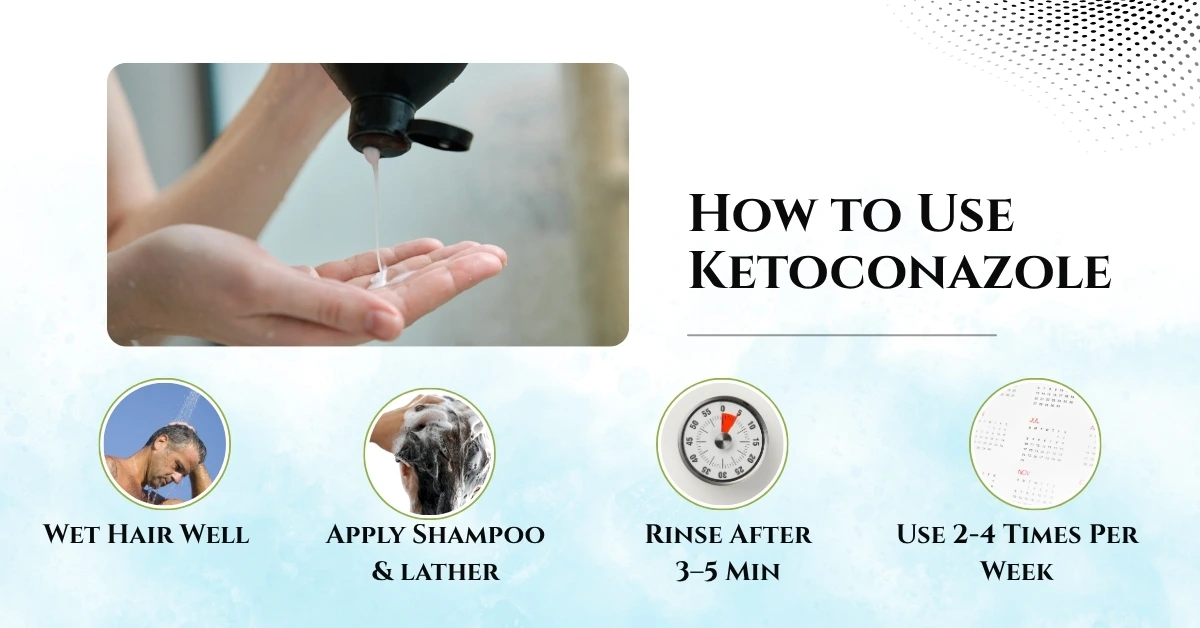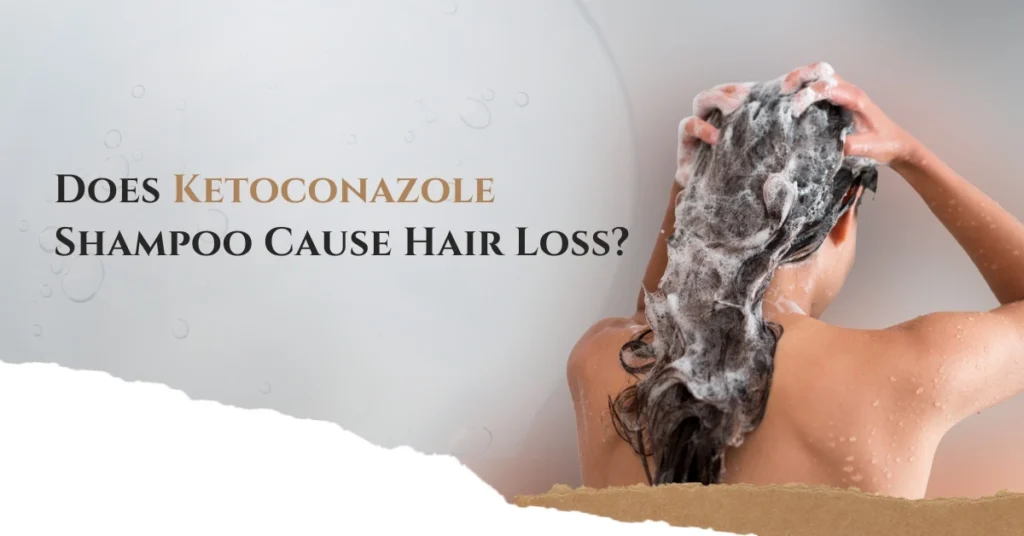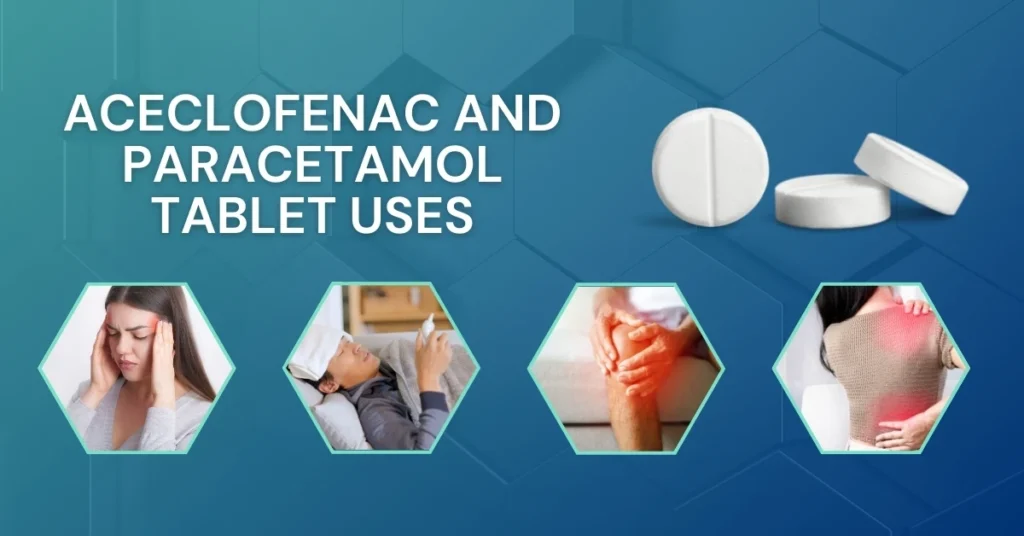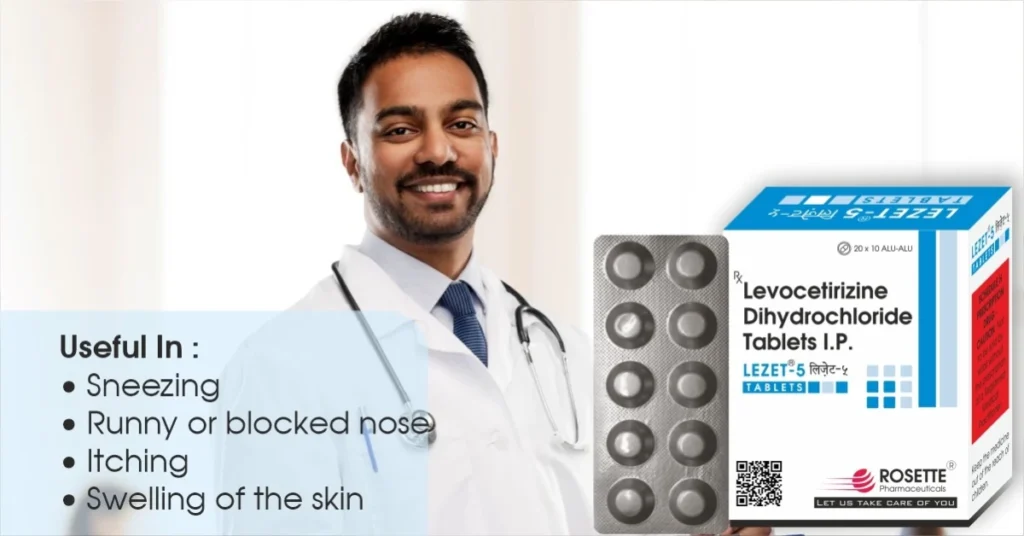Many people associate ketoconazole shampoo only with dandruff, but it also plays a role in hair-loss treatment. By targeting scalp issues linked to androgenic alopecia, it helps improve scalp health. Its strong antifungal benefits reduce scalp inflammation that can worsen shedding. Because of this, dermatologists often suggest it for off-label usage as part of hair-loss care.
Ketoconazole’s dual role sets it apart — it soothes irritation and supports the scalp against hormone-related hair thinning. This distinction between dandruff vs hair loss highlights why it’s studied as a support option for androgenic alopecia. Though not a cure, its scalp-friendly action makes it a helpful addition to many hair-loss treatment plans.
How Ketoconazole Shampoo Supports Hair Retention
Researchers have found that the antifungal action of ketoconazole does more than control scalp infections. By easing scalp inflammation reduction, it helps create a cleaner, calmer environment where hair roots can thrive. This healthy scalp condition supports follicle protection, preventing further damage that often leads to shedding.
What makes ketoconazole especially interesting for hair care is its reported impact on the hormonal pathway linked to thinning. Some studies suggest that it contributes to DHT inhibition, targeting the enzyme 5-alpha reductase that converts testosterone into DHT, a key factor in pattern baldness. Together, these effects not only protect existing strands but also encourage hair-growth stimulation, making it a valuable aid in managing hair loss.
Benefits for Hair & Scalp in Hair-Loss Context
One of the key reasons ketoconazole is valued in hair-loss care is its strong role in dandruff relief and fungal infection control. By tackling these underlying scalp issues, it supports a cleaner environment that encourages follicle support. Reducing flakes and irritation often linked to seborrheic dermatitis care also helps prevent the stress that weakens the roots, making it easier to maintain improved hair retention.
Dermatologists highlight that the shampoo’s anti-inflammatory effect plays an equally important role. Calming redness and itchiness not only promotes scalp health improvement but also strengthens the foundation for future growth. Together, these benefits create a more stable scalp ecosystem where hair can remain anchored and less prone to shedding.
Potential Risks & Side Effects of Ketoconazole Shampoo
Common Side Effects
Dermatologists often remind patients that most reactions to ketoconazole are mild and temporary. Some people may notice itching, slight scalp dryness, or redness after use. Others experience a light burning feeling, mild irritation, or occasional stinging. In a few cases, persistent flaking of the scalp may occur, and those with sensitive skin could develop allergic reactions that need medical attention.
Rare Effects – Hair Discoloration & Telogen Effluvium
Although uncommon, there have been reports of pink hair discoloration caused by the shampoo’s FD&C Red No. 40 dye, which can lead to pigment deposition in hair that is especially porous aging hair. Under microscopic review, experts have observed microscopic dye particles binding to fragile strands, sometimes worsened by contaminated water or exposure to other agents like selenium sulfide or tar.
A few individuals have also reported minoxidil-related discoloration when using the two products together. Stress factors may contribute to stress-triggered shedding, but such changes are typically a reversible loss once the cause is addressed.
Does Ketoconazole shampoo Cause Hair Loss?
Many concerns about ketoconazole shampoo leading to hair thinning come from user misconceptions rather than proven facts. Dermatologists emphasize that most cases of hair fall linked to its use are often due to myth debunking. Some users experience temporary shedding or mild scalp irritation, but these effects are typically short-lived and do not indicate permanent damage.
- Occasional temporary shedding can occur as older hairs fall out, making way for new growth.
- Mild scalp irritation may sometimes loosen hair strands but usually resolves quickly.
- Rarely, people experience telogen effluvium or stress-induced loss, which is usually a reversible condition once the cause is addressed.
- The prevailing scientific consensus shows that ketoconazole does not directly lead to permanent hair loss.
- Most fears arise from user misconceptions rather than clinical evidence.
How to Use Ketoconazole for Hair Loss

Shampoo Application & Frequency
- Start with wet hair to help the shampoo spread evenly.
- Gently massage to create a rich scalp lather for full coverage.
- Leave it on for a 3–5 minute contact time to allow the medication to work.
- Rinse thoroughly to remove all residue and avoid irritation.
- Choose a 1%–2% concentration based on your doctor’s advice.
- Apply every 2–4 days as recommended for best results.
- Always follow dermatologist guidance to ensure proper usage.
Treatment Duration & Monitoring
- Maintain consistent application to achieve steady progress.
- Follow the regimen for a 4–6 month timeline to notice significant changes.
- Combine with other therapies for a stronger combined therapy response.
- Schedule regular dermatologist follow-up to monitor progress.
- Keep up routine side-effect check to ensure safety during use.
- Expect gradual visible results rather than immediate improvements.
Who Should Consider Ketoconazole Treatment
Dermatologists often suggest ketoconazole shampoo for men with androgenic alopecia who want to manage hormone-related hair thinning. It is also considered helpful for women with early-stage hair loss, as it can support a healthier scalp environment before the condition progresses. By reducing fungal growth and irritation, it can benefit seborrheic dermatitis patients as well as those dealing with persistent scalp inflammation cases.
Because each hair-loss situation is unique, experts recommend that such treatment be started under the advice of dermatologist-guided users. People who want to regain a sense of self-assurance—often referred to as confidence restoration seekers—can also benefit from including ketoconazole shampoo as part of a broader care plan aimed at protecting scalp health and reducing further shedding.
Medical Disclaimer: This content is for informational purposes only and is not a substitute for professional medical advice. Always consult a qualified doctor or dermatologist before starting, changing, or combining any hair-loss treatments.
Read More: Ketoconazole Shampoo: Powerful Relief for Dandruff & Itchy Scalp.
Conclusion
Ketoconazole shampoo has earned attention as a supportive option in managing hair loss, especially for those facing scalp issues alongside thinning. While it is not a cure, its dual action—combining antifungal care with potential hormone-related benefits—can improve scalp conditions that often worsen shedding.
Used with proper dermatologist guidance and combined with other proven therapies, it can help reduce misconceptions about its risks and play a meaningful role in maintaining scalp health and supporting long-term hair retention.
FAQs
Q1: Does ketoconazole shampoo cause hair loss?
Ans: No, it usually doesn’t cause hair loss; in some cases, mild temporary shedding may occur but is reversible.
Q2: How often should I use ketoconazole shampoo for hair loss?
Ans: Most dermatologists recommend using it 2–4 times a week, as advised for your condition.
Q3: Can women use ketoconazole shampoo for early-stage hair loss?
Ans: Yes, it can be helpful for women with early-stage hair thinning under medical supervision.
Q4: How long does it take to see results?
Ans: Visible results typically appear after 4–6 months of consistent use.
Q5: Can ketoconazole be used with minoxidil or finasteride?
Ans: Yes, it is often combined with these treatments for better results, under dermatologist guidance.
Q6: Are there any serious side effects of ketoconazole shampoo?
Ans: Serious reactions are rare; most users experience only mild scalp dryness or irritation.
Q7: Is ketoconazole shampoo safe for long-term use?
Ans: It is generally safe for long-term use when monitored by a dermatologist.
Q8: Can ketoconazole shampoo help with dandruff and hair loss together?
Ans: Yes, it addresses both by reducing scalp inflammation and improving overall scalp health.



